Environment
Environmental Policy
The NSSOL Group positions the reduction of environmental impact as one of the most important management issues, and thus, to fulfill our corporate social responsibility, works toward reducing the environmental impact that may arise as a result of our business activities. We also strive to reduce the environmental impact of society as a whole through our business, and thereby contribute to the preservation of the global environment and the realization of a sustainable society by, among other means, taking appropriate measures against climate change issues.
Action Agenda
- We contribute to the reduction of the environmental impact of our customers and society and the preservation of the global environment through our business activities.
- We comply with environmental laws and regulations and agreements with our stakeholders when we conduct our business activities.
- We work toward reducing our environmental impact when we conduct our business activities by, among other means, reducing greenhouse gas emissions, efficiently using resources and energy, utilizing, and recycling goods, and reducing waste.
- We have established an environmental management system and operate it to achieve our environmental goals, review it on a regular basis, and make efforts to continuously improve the system.
- We strive to improve the environmental awareness of each employee by promoting environmental education and awareness-raising activities for the reduction of our environmental impact and preservation of the global environment.
- We actively promote communication with internal and external stakeholders with regard to our actions on climate change and other activities to reduce our environmental impact.
Promotional Structure
We have established the Sustainability Committee, chaired by the Representative Director and President, to promote efforts to address sustainability issues. With the reduction of environmental impact, including actions to address climate change issues, positioned as a material issue, we have also established the Environmental Management Committee, chaired by the director in charge, under the Sustainability Committee to analyze the business risks and opportunities associated with climate change, deliberate on measures to address them, manage targets and results of environmental impact indicators, and promote initiatives to reduce environmental impact.
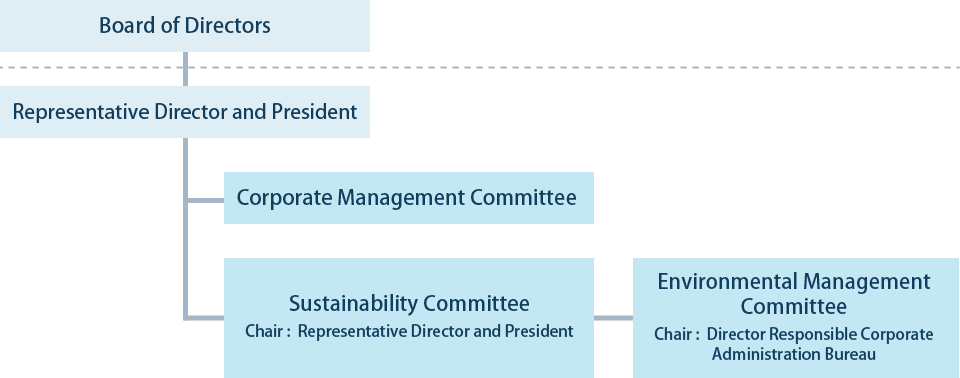
Information Disclosure Recommended by TCFD
The Task Force on Climate-related Financial Disclosures (TCFD) was created by the Financial Stability Board at a request of the G20 to mitigate the risk of instability in financial markets caused by climate change. In June 2017, TCFD issued recommendations for companies to identify and disclose risks and opportunities presented by climate change. We announced our support for the TCFD recommendations in April 2022.
Governance
We have established the Sustainability Committee, chaired by the Representative Director and President, as a system to promote our initiatives to deal with sustainability issues. With the reduction of environmental impact, including actions to address climate change issues, positioned as a material issue, we have also established the Environmental Management Committee, chaired by the director in charge, under the Sustainability Committee to analyze the business risks and opportunities associated with climate change, deliberate on measures to address them, manage targets and results of environmental impact indicators, and promote initiatives to reduce environmental impact. When we carry out our activities, we implement PDCA management under the environmental management system we created based on ISO 14001 standards. The Sustainability Committee receives reports from the Environmental Management Committee and reviews the policy on the actions on climate change issues and other sustainability issues and the status of progress of actions taken. Important issues are reported to the Board of Directors.
Strategy
We analyzed the 1.5℃ scenario and the 4℃ scenario with a medium- to long-term time horizon to 2050.
Under the 1.5℃ scenario, there is a risk of increased electricity costs due to strengthened legal requirements, including the introduction of carbon pricing, while needs such as saving and optimizing energy can be regarded as a business opportunity.
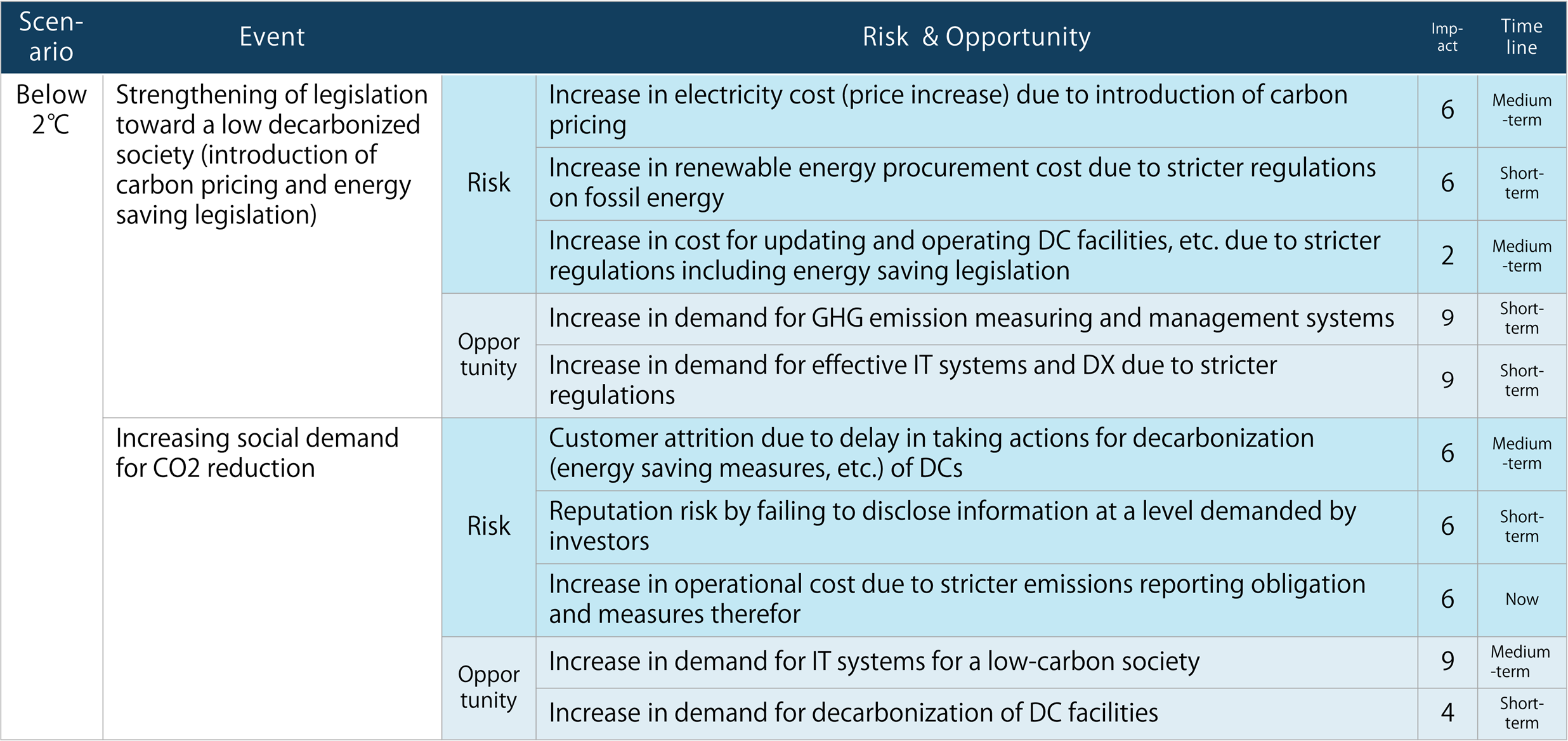
Under the 4℃ scenario, there is concern that intensified climate change may affect business activities, such as a shutdown of DC operations and office functions, but early implementation of countermeasures will ensure business continuity and sales opportunities.
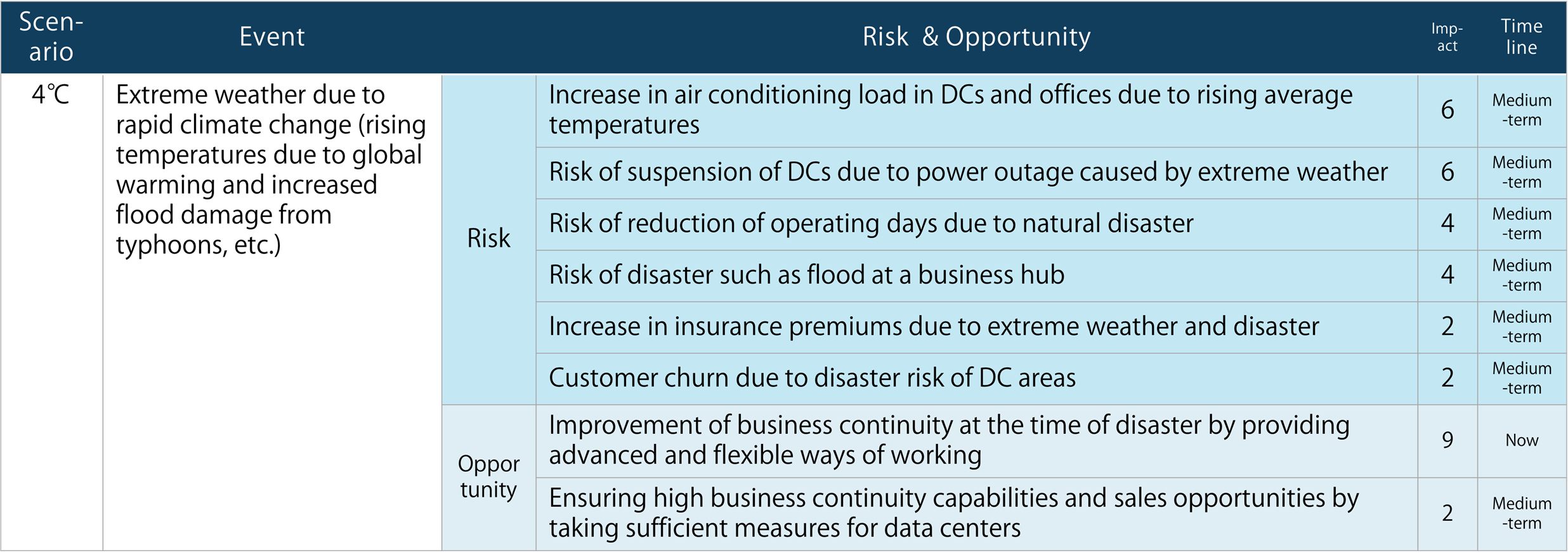
Note: DC stands for data center
Impact
Impact = “Probability of impact” × “Severity of impact”
- Probability of impact
3: Highly probable (90% or more); 2: Probable (50 - 90%); Less probable (10 - 50%); 0: Not probable - Severity of impact
3: Extremely severe (significant impact on the revenue of the entire company); 2: Severe (business-wide impact in two businesses (operation and services)); 1: Minor (impact on the main operation of one business); 0: Almost no impact
Timeline
- Short-term: Will occur by 2027
- Medium-term: Will occur by 2030
- Long-term: Will occur by 2050
Risk Management
- Addressing risks and opportunities from an environmental perspective The Environmental Management Committee under the Sustainability Committee analyzes, throughout the entire company in a cross-sectional manner, risks and opportunities related to environmental issues including issues concerning climate change, reviews actions to be taken, reports the results to the Sustainability Committee, and reports important issues to the Board of Directors.
- Dealing with risks and opportunities through an autonomous internal control system of the NSSOL Group
The NSSOL Group has created and continues to improve an internal control system based on autonomous internal control.
Each section conducts risk management including understanding, assessing, and controlling business risks including climate change issues, and functional sections monitor the status of implementation and compliance.
The status of activities of each section and functional sections is understood and assessed by the Internal Control and Audit Department through internal audits. The status of monitoring and internal audit by functional sections, including actions taken for environmental risks and opportunities mentioned in 1, is reported to the Internal Control Committee. Of these matters, important issues are reported to the Board of Directors.
Metrics and Targets
GHG emissions
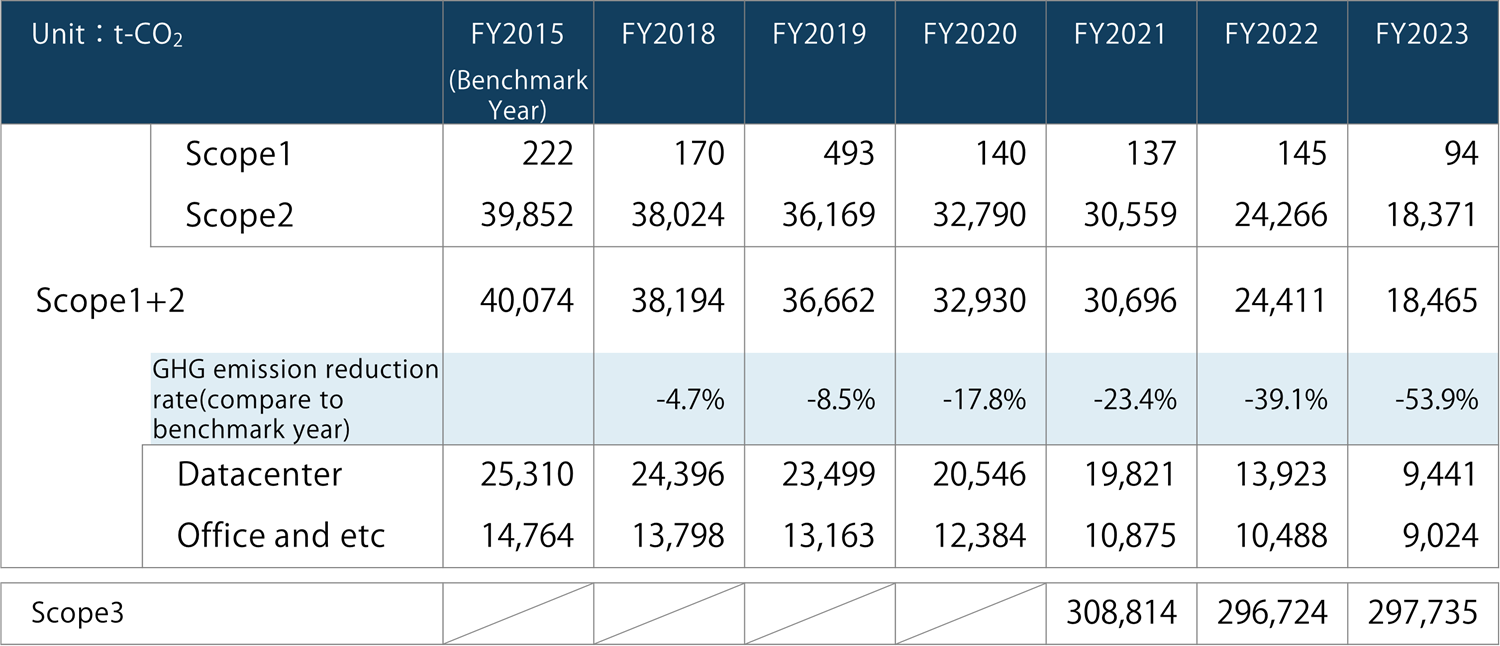
The scope of reporting includes domestic consolidated subsidiaries.
GHG emissions are calculated based on Japanese law. The difference in Scope 1 and 2 from FY2021 to FY2022 includes both the impact of changes in reporting rules under Japanese law and real reductions due to increased renewable energy procurement and other factors.
Scope 3 (emissions of other companies related to the company's activities) has been calculated since FY2021.
Sources of Scope 3 emissions

Category 4 emissions are included in Category 1 in the calculation.
There are no emissions for categories 9, 10, 14, and 15.
Targets: Reducing the GHG emissions of Scope 1 and 2
FY2050
In response to society’s efforts to become carbon-neutral by 2050, we aim to achieve carbon neutrality as a company (Scope 1 and 2 combined) by 2050.
FY2030
We actively promote the introduction of renewable energy in DCs and offices, and aim to reduce GHG (Scope 1 and 2 combined) by 50% of the 2015 level.
Environmental Management System (NSSOL EMS)
NSSOL has acquired ISO 14001 certification, an international standard for environmental management systems, for offices and data centers in its head office area. We have also created the NSSOL EMS, our own environmental management system combining ISO-compliant initiatives with responses to the TCFD recommendations. As of FY2022, we have expanded the scope of coverage to regional bases and group companies in Japan.
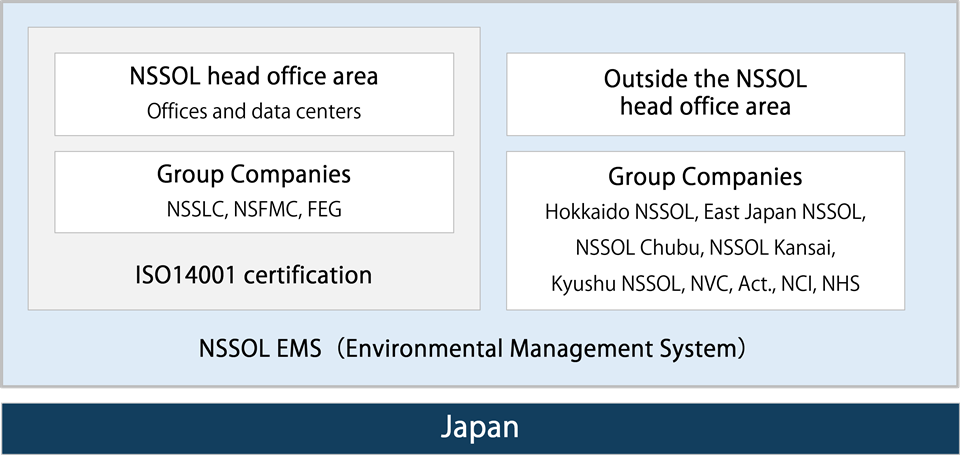
Specific Actions
Reducing Power Consumption
Reduce working hours by implementing work style reforms, turning off lights in unused areas, optimizing temperature settings for air conditioning, cooling, and heating, thorough power-saving settings for PCs and monitors, and utilizing power-saving equipment
Reducing Paper Consumption
Promoting paperless operations by installing displays in conference rooms and utilizing communication tools
Waste
Persons in charge assigned to each floor to ensure thorough separation and management of garbage generated on a daily basis
Education
Conducting e-learning (once a year for employees, and for partners upon appointment), and distributing information on NSSOL EMS initiatives via the Intranet
Other
Priority given to purchasing green products for internal use (offi ce supplies and consumables)
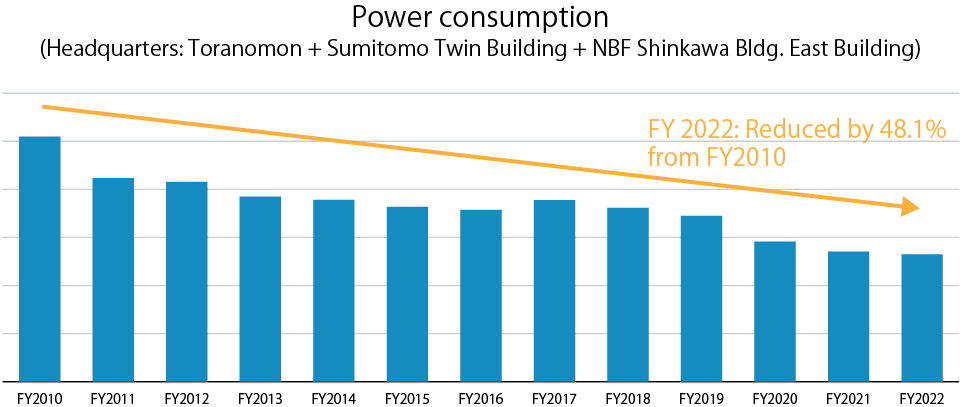
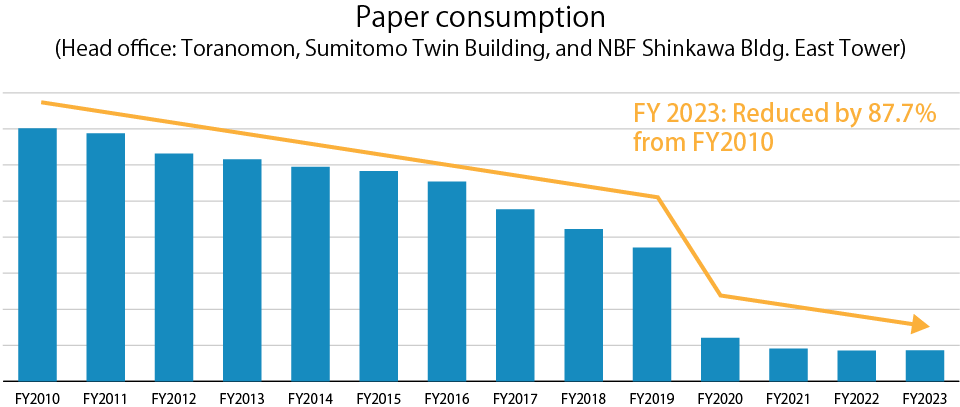
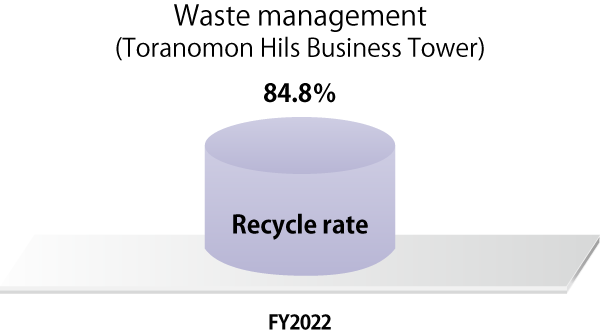
Compliance with Environmental Laws and Regulations
Major Applicable Laws and Regulations
- Act on Rationalizing Energy Use, Act on Promotion of Global Warming Countermeasures
Energy consumption reported based on Act on Rationalizing Energy Use
Unit:kl FY2015 FY2016 FY2017 FY2018 FY2019 FY2020 FY2021 FY2022 FY2023 FY2024 Energy consumption
(crude oil equivalent: kL)18,838 19,209 19,732 19,459 19,018 17,488 16,510 13,233 11,512 10,649 - Ordinance concerning Environment to Ensure Health and Safety of Citizens of Tokyo (Environmental Assurance Ordinance)
Report on Global Warming Countermeasures (Small- and medium-sized enterprises in Tokyo) (Japanese only) - Waste Management and Public Cleansing Act (Waste Management Act)
ISO 14001 Certification
| Certifications | ISO 14001:2015/JIS Q 14001:2015 |
|---|---|
| Certification/Registration Body | JIC Quality Assurance Ltd. |
| Registration Number | E618 |
| Registered Organization | NS Solutions Corporation, Head Office |
| Registration Date | April 17, 2003 |
| Expiry Date | April 16, 2027 |
| Relevant Organizations within the Scope of Registration |
Sumitomo Twin Building Site Hibiya Office NSSLC Service Corporation, Head Office NSSLC Service Corporation, East Japan Office No. 2 Financial Engineering Group, Inc. NS Financial Management Consulting, Inc. Data Center 1 Data Center 5 ITO Center East Japan |
Our Efforts to Reduce Environmental Impact through Business
NS Solutions promotes resource saving and energy saving in accordance with our environmental policy by making our customers’ business more efficient. Here are some examples.
Promotion of Utilization of Data Center
Our state-of-the-art energy-saving data centers are designed to achieve advanced environmental performance, i.e., PUE 1.4* or lower. By suggesting that our customers use our data centers, we help them to reduce power consumption and also help preserve the global environment.
- Introduction of our data centers (Japanese only)
*Power Usage Effectiveness (PUE)
The value obtained by dividing the power consumption of the entire data center by the power consumption of servers and other IT equipment. The smaller the value, the higher the effectiveness. The former includes the power consumed by servers, storage devices, routers, and other IT equipment as well as power consumed by air conditioners, electric equipment, lighting, monitoring devices, and other devices and equipment.
Examples at Our Customers
- Supercomputer of the National Institute for Environmental Studies introduced by NSSOL was ranked 8th in the world as an energy-efficient supercomputer. (Japanese only)
- Satellite data research and analysis system of the National Institute for Environmental Studies introduced by NSSOL was ranked among the top 10 of Green500. (Japanese only)
- Ground system with high availability was introduced to promote the operation of Himawari-8 and -9 meteorological satellites. (Japanese only)
- Transforming the system operation system to speed up the expansion of business; comprehensive outsourcing was introduced to focus on the core business. (Daito Trust Construction Co., Ltd.) (Japanese only)
- Main data center was relocated to Kitakyushu; flexibility of cloud services was utilized to the maximum extent. (Yazaki Corporation) (Japanese only)
- Infrastructure was rebuilt by using cloud services for different purposes; improvement was made to increase speed and reduce operational costs. (Lawson, Inc.) (Japanese only)
- Electronic contracts were introduced to make expenses more transparent; cost reduction was achieved by reviewing unnecessary contracts. (Nomura Securities Co., Ltd.) (Japanese only)
- User friendliness and speed were improved by using “electronic contracts” to strengthen the competitiveness of their mortgages. (Mizuho Bank) (Japanese only)
- Other examples at our customers (Japanese only)
Promotion of Utilization of Cloud Services
We offer cloud services using our state-of-the-art data centers. Our customers will be able to eliminate their own servers by using our cloud services, which will directly lead to a reduction of power consumption. We believe that our cloud services operated through our power-efficient data centers will also help preserve the global environment.
- Introduction of absonne (Japanese only)
- Introduction of M³DaaS@absonne (Japanese only)

